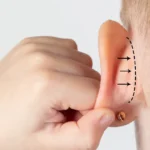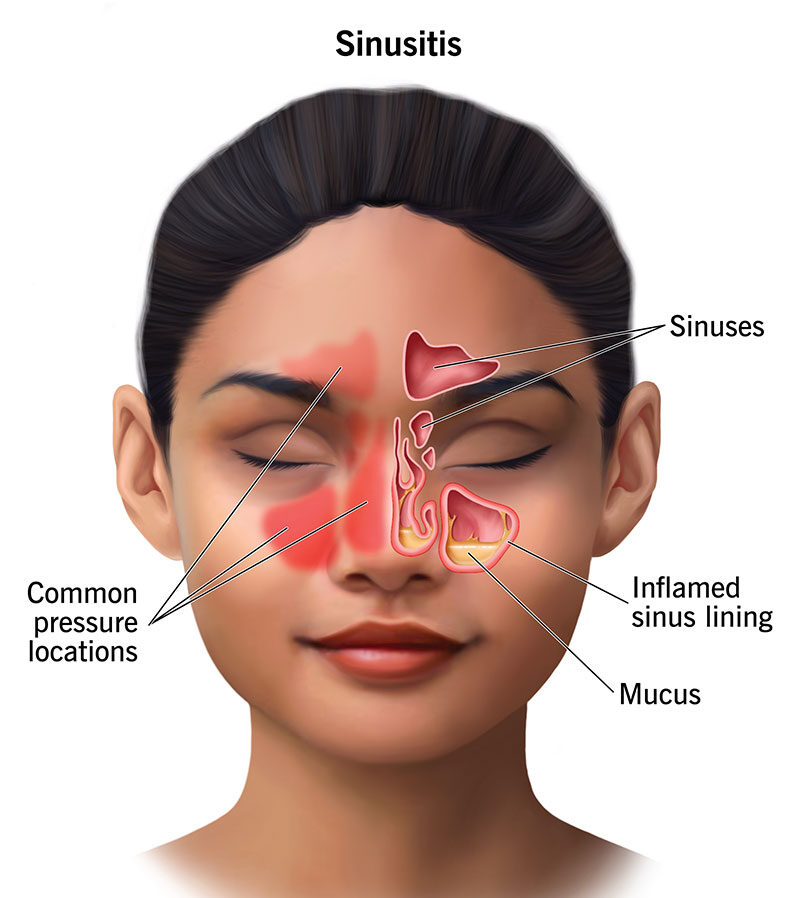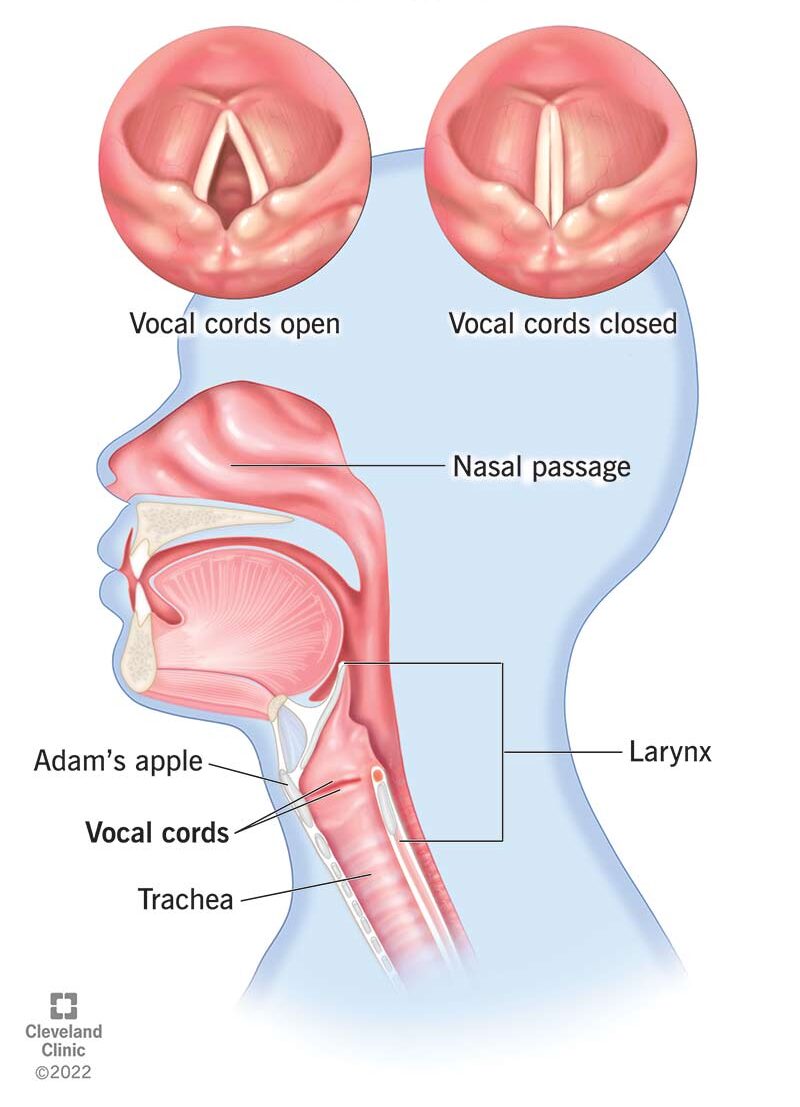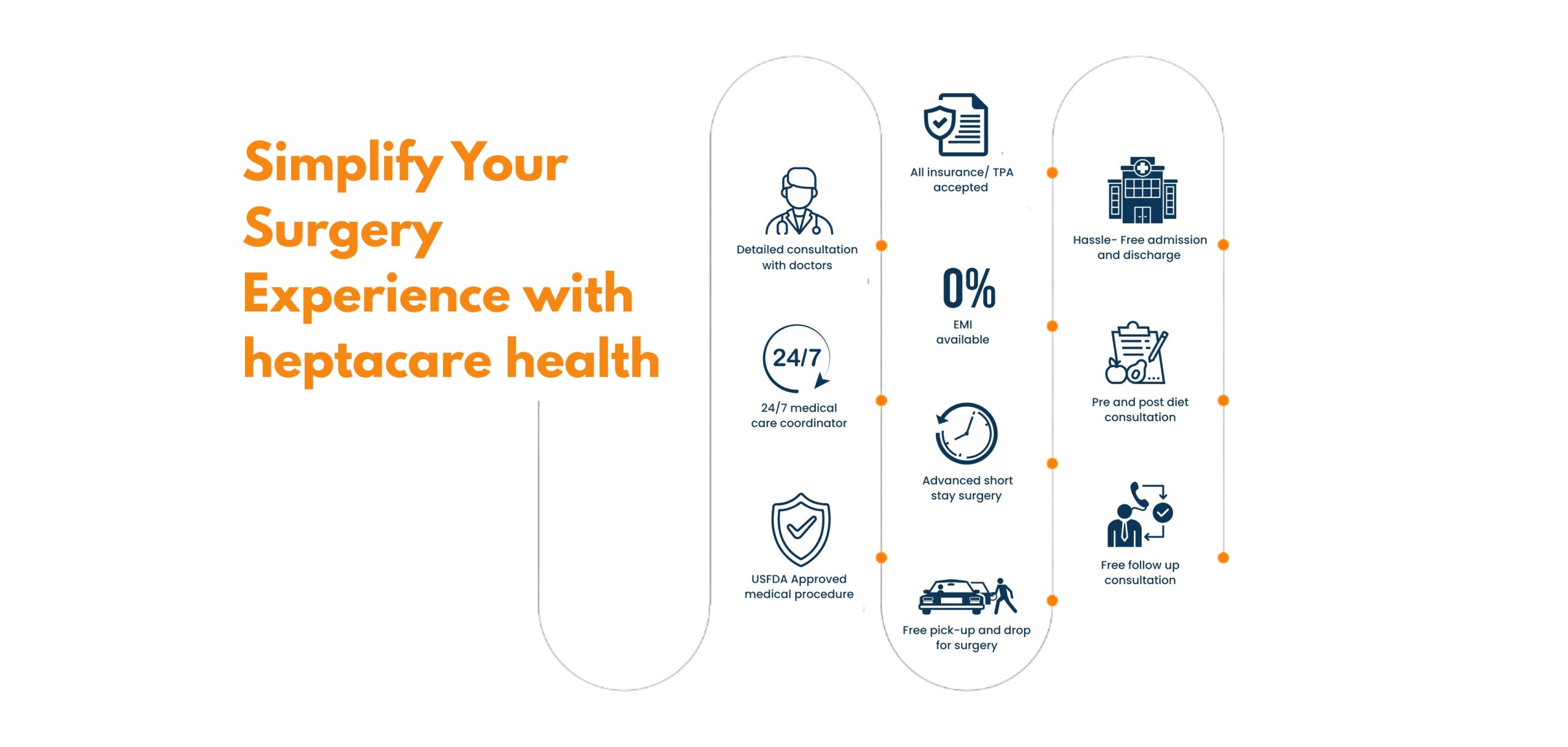Tonsillectomy is a surgical procedure in which both palatine tonsils are fully removed from the back of the throat. Visit HeptaCare Health and undergo a safe and effective tonsillectomy surgery in India. We work with expert and experienced ENT surgeons who have years of experience in performing various surgeries, including tonsillectomy. Book an appointment with us now.
Happy Patients
Disease
Hospitals
Cities
Tonsillectomy is the surgical procedure to remove tonsils. Tonsils are two fleshy, oval-shaped pads of tissue at the back of the throat. Tonsillectomy surgery is the most effective and long-lasting treatment for sore throat. It drastically improves the quality of life for people suffering from chronic tonsillitis.
It also helps in treating breathing and other problems related to enlarged tonsils and rare diseases of the tonsils. The recovery time for a tonsillectomy is usually at least 10 days to 2 weeks. However, the recovery period can vary from person to person, depending on their overall health condition.
Tonsillectomy is required to treat the following conditions:
Tonsillectomy is also considered if the symptoms related to tonsillitis, such as pain and difficulty in swallowing, breathing difficulties, sleep apnea, swelling in the neck glands, etc., severely impact your life.
Different types of tonsillectomy surgery are as follows:
It is a laser procedure in which the tonsils are removed using a focused, high-energy radiofrequency beam. It is also known as radiofrequency tonsil ablation.
In this surgery, a harmonic scalpel cuts the inflamed tonsils through vibration energy. It generates heat and friction, leading to protein denaturation and dissection of the tonsils.
In this procedure, the surgeon uses low-energy electrocautery to remove the inflamed tonsils. It is one of the oldest or most conventional methods for tonsil removal.
A cold knife dissection is traditional open surgery for tonsil removal. The surgeon uses a cold or sharp knife to cut the tonsils and their capsules from the surrounding tissues.
Prior to the surgery, a comprehensive diagnostic evaluation is necessary to determine the severity of the condition and ensure that tonsillectomy is the appropriate treatment. The ENT doctor will perform the following diagnostic tests:
In some cases, additional diagnostic tests such as a complete blood count (CBC), X-ray, or CT scan may be required for more severe presentations.
Prior to the surgery, a comprehensive diagnostic evaluation is necessary to determine the severity of the condition and ensure that tonsillectomy is the appropriate treatment. The ENT doctor will perform the following diagnostic tests:
In some cases, additional diagnostic tests such as a complete blood count (CBC), X-ray, or CT scan may be required for more severe presentations.
Tonsillectomy surgery is typically performed under general anesthesia to ensure a pain-free experience for the patient. Once the diagnosis is established, the surgeon and patient collaborate to determine the most suitable treatment approach. Coblation and cauterization tonsillectomy are commonly regarded as the most effective techniques to remove tonsils.
During electrocautery or cauterization tonsillectomy, the surgeon employs low-energy electrocautery to remove the inflamed tonsils. Coblation tonsillectomy, on the other hand, utilizes low-temperature radiofrequency and a saline solution to gently and precisely extract the tonsils. Both methods minimize damage to surrounding tissues, leading to a faster recovery.
The tonsillectomy procedure generally lasts around 20-30 minutes, after which the patient is transferred to a recovery ward. In most cases, patients are discharged within 24 hours, even if they undergo overnight observation in the hospital.
Some common benefits of tonsil surgery are as follows:
Before undergoing a surgical procedure, it is essential for the physician to assess the individual’s medical history and current medications. This evaluation provides a comprehensive understanding of the patient’s overall health status.
Listed below are some preparation tips to follow before tonsils surgery:
After a tonsillectomy, it usually takes around 2-3 weeks to fully recover. To facilitate your recovery, here are some simple tips to follow:
Please note that these tips are general recommendations, and it’s crucial to follow the specific instructions provided by your surgeon or healthcare team for your recovery.
Tonsillectomy, like any surgical procedure, carries certain risks:
It’s important to remember that these risks are generally low, and healthcare professionals take precautions to minimize them.
Following a tonsillectomy, the ENT surgeon typically provides post-operative instructions that are important to adhere to for a smooth and prompt recovery. Immediately after the surgery, scabs may form in the area where the tonsils were removed. These scabs typically remain in place for approximately 5 to 10 days before naturally falling off. However, if they detach prematurely, it can lead to bright red bleeding, necessitating medical attention.
The recovery period after a tonsillectomy generally spans around 2-3 weeks, but this duration can vary depending on the patient’s overall health. Once you consult with the doctor, you can return to work within two weeks after the procedure. To alleviate discomfort and expedite recovery during this time, the following lifestyle changes can be helpful.
Remember, it is important to adhere to your surgeon’s specific instructions and recommendations to ensure a smooth and successful recovery following tonsil removal surgery.
The Average tonsillectomy surgery cost in India is INR. 75100. However, the cost is variable and depends on a variety of factors, including:
Yes, tonsillectomy is generally covered by most major insurance policies, however, this coverage may be subject to specific policy terms such as waiting period, sub-limit, etc. If you are unsure about your insurance policy coverage, you must contact your insurance provider to find out your exact policy terms and coverage.
Medications
Here are some medications that may be prescribed for tonsil infections:
Here are some home remedies that can provide relief for tonsil infections:
While these non-surgical treatments can alleviate symptoms and aid healing, they may not fully address chronic or recurrent tonsil infections. In such cases, surgical interventions like tonsillectomy (tonsil removal) may be recommended. Consult a medical professional for an accurate diagnosis and appropriate treatment plan.
Before surgery, you must ask the following questions to your surgeon to have a better understanding of the procedure and the risks and complications associated with it:


Based on 7721 Recommendations | Rated 4.68 Out of 5
Happy Patients
Clinics
Cities
Surgeries
Doctors
Hospitals

Ear surgery reshapes and balances your look.
Confidence restored with natural, lasting results.

A minimally invasive procedure to clear blocked sinuses and improve breathing.
It relieves sinus infections, nasal congestion, and headaches effectively.

Sinus treatment relieves blockage, pain, and pressure.
Breathe easier with advanced, long-lasting care.

Thyroidectomy removes part or all of the thyroid gland.
It helps treat thyroid nodules, goiter, or cancer effectively.

Nasal polyps are soft, painless growths in nasal passages.
Treatment helps restore easy breathing and clear sinuses.

Vocal cord polyp is a benign growth affecting voice.
Treatment restores clear speech and vocal health.

Ear pain or itching may occur due to earwax buildup, infection, allergy, or fungal infection. Avoid inserting objects like earbuds or pins — it can worsen the problem. A proper ENT check-up is recommended.
Never use cotton buds. Instead, use doctor-prescribed ear drops or visit an ENT specialist who can clean your ear safely using suction or irrigation.
Blocked ears can happen due to wax, fluid behind the eardrum, or sinus issues. ENT evaluation and simple cleaning or medication usually fix it.
Tinnitus may result from exposure to loud sounds, ear infections, or nerve-related hearing loss. It’s best to get a hearing test and ENT consultation.
●ear surgery cost in Vizag ● nose surgery cost in Vizag ● throat surgery cost in Vizag ● ENT treatment cost in Vizag ● ear surgery cost in Hyderabad ● nose surgery cost in Hyderabad ● throat surgery cost in Hyderabad ● ENT treatment cost in Hyderabad ● ear surgery cost in Vijayawada ● nose surgery cost in Vijayawada ● throat surgery cost in Vijayawada ● ENT treatment cost in Vijayawada ● low-cost ENT surgery near me ● affordable ENT treatment near me ● low-cost ear surgery near me ● low-cost nose surgery near me ● low-cost throat surgery near me ● best ENT surgery cost near me ● ENT surgery packages in Vizag ● ENT surgery packages in Hyderabad ● ENT surgery packages in Vijayawada ● ENT operation price near me ● ear operation cost near me ● sinus surgery cost near me ● tonsil surgery cost near me ● septoplasty cost near me ● adenoid surgery cost near me ● laser ENT surgery cost near me ● ENT treatment with insurance in Vizag ● ENT treatment with insurance in Hyderabad ● ENT treatment with insurance in Vijayawada ● ENT surgery with EMI in Vizag ● ENT surgery with EMI in Hyderabad
Disclaimer: **The result and experience may vary from patient to patient.. ***By submitting the form or calling, you agree to receive important updates and marketing communications.
Getting an accurate diagnosis can be one of the most impactful experiences that you can have.

cure with care
Copyright © 2025. All rights reserved.
Consult with our expert surgeon for more than 50+ diseases
Happy Patients
Hospitals
Cities